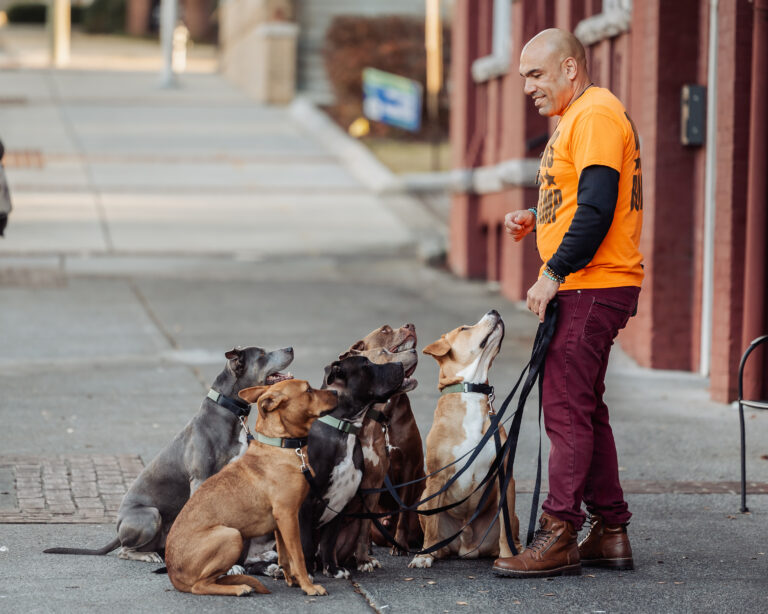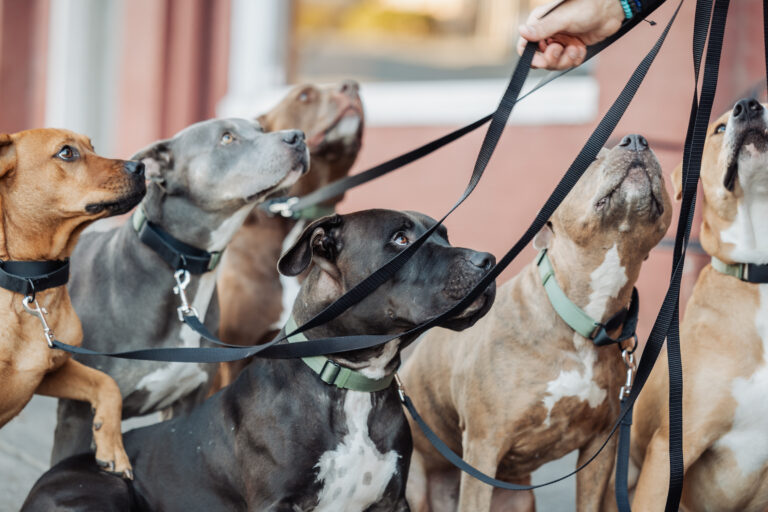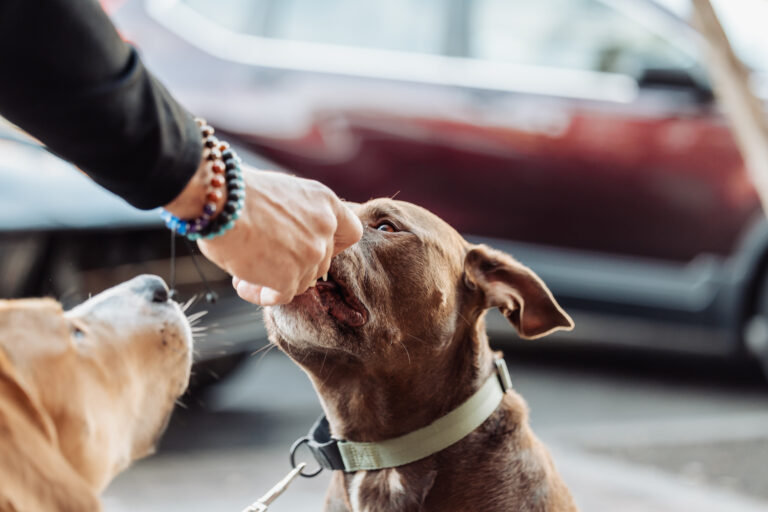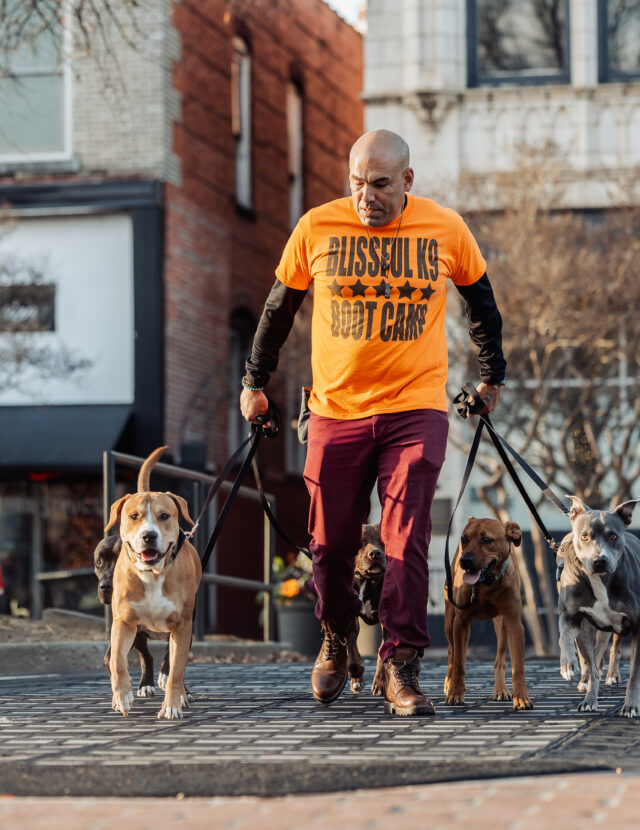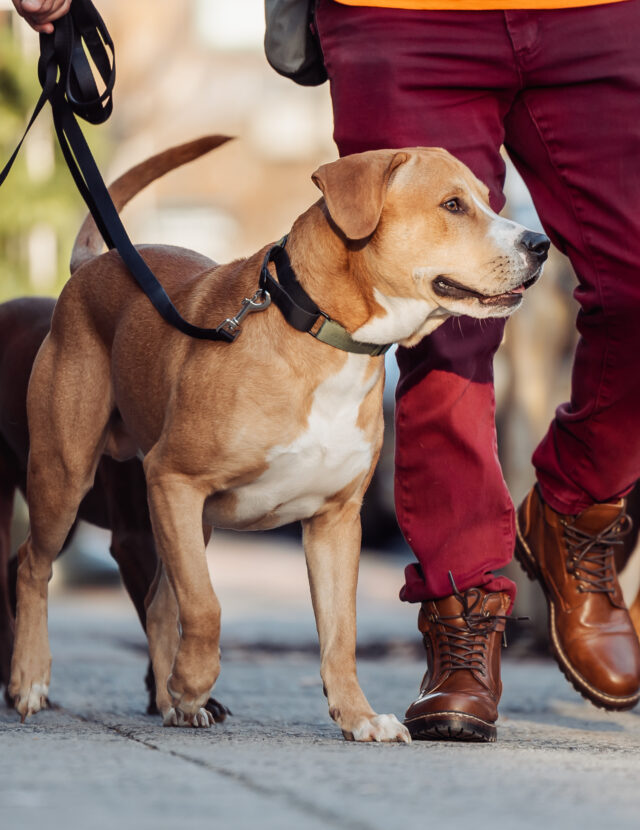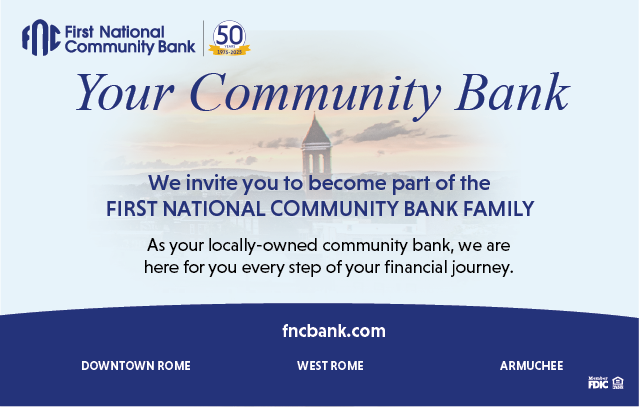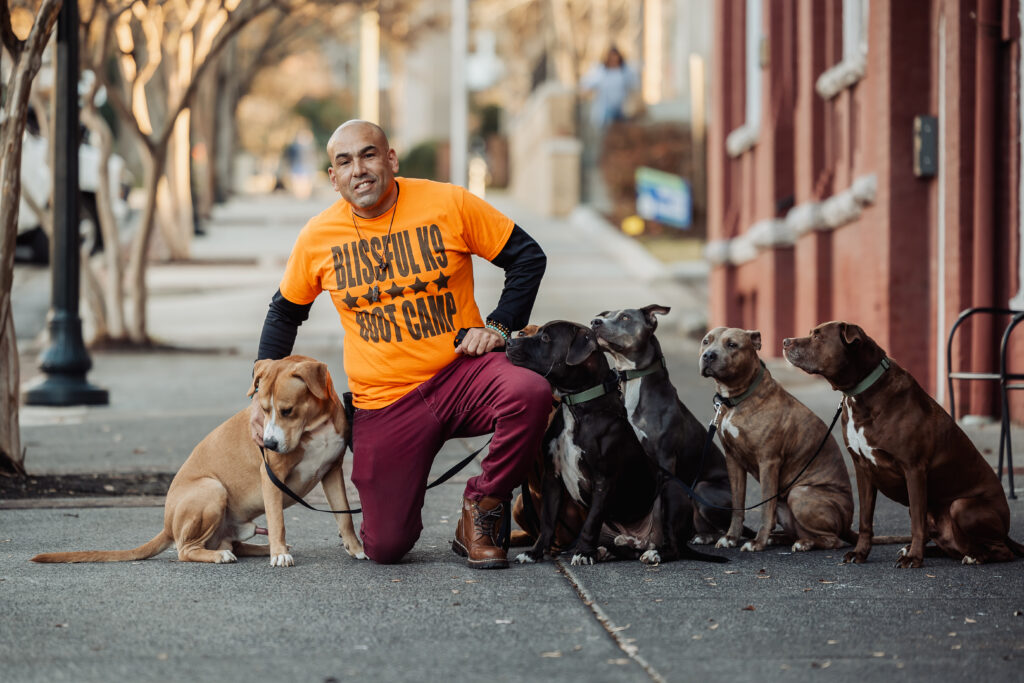
Photos Andy Calvert
Dogs offer humans comfort, companionship, and a rare type of nonjudgemental friendship. Few things give people more joy than owning a dog that offers them unconditional love. Still, dogs are not replacements for human relationships. Canines are not people, and they require guidance, care, and leadership from those who take them into their homes and lives.
Owning a dog is both a privilege and a responsibility, and living up to that duty often takes a proactive effort to educate oneself on the subject. Atom Gullo, owner of Blissful K9 in Rome, Georgia, has that brand of expertise that can teach a dog discipline and obedience, while also instructing the dog’s owner in the fundamentals of dog training.
Building a foundation
A Saturday stroll down Broad Street will convince a visitor that Rome is a dog town. There are lots of dog walkers and many of the businesses keep water bowls on the sidewalks outside their doors. Such organizations as Blissful K9 and P.A.W.S. (Public Animal Welfare Services) work hard to see to the needs of dogs and to encourage responsible pet ownership.
Gullo offers a Boot Camp program that trains dogs in such basics as obedience, behavior modification, and socialization. This work places a special emphasis on what Gullo calls “real-world training.” It’s important to him that dogs learn how to effortlessly meld into the lives of their owners without being intimidated by strangers or other animals.
Blissful K9 also offers a more comprehensive training program as well. “In my Board & Train program, I take a dog home with me for two, three, or four weeks,” Gullo says. “I have them twenty-four-seven, and I work with them on anything from obedience to whatever kind of behavior modification they need. Socialization out in public. I’ll take them to places like Home Depot or Broad Street. I’m a lifestyle trainer; I help you to enjoy your life with your dog, so you won’t have to leave him at home because he doesn’t know how to behave himself.”
When asked how old a dog should be before it can be trained, Gullo explains, “Personally, I won’t train a dog until they’re vaccinated and can go outside, but an owner can start training a dog as soon as it can walk, see, and hear.” And regarding different breeds, he says, “Any breed can be trained. There are working dogs, like shepherds, and dogs more apt for sports. Some dogs are better in one area than another. Every dog has some sort of background in what they were bred for—herding, working, hunting.”
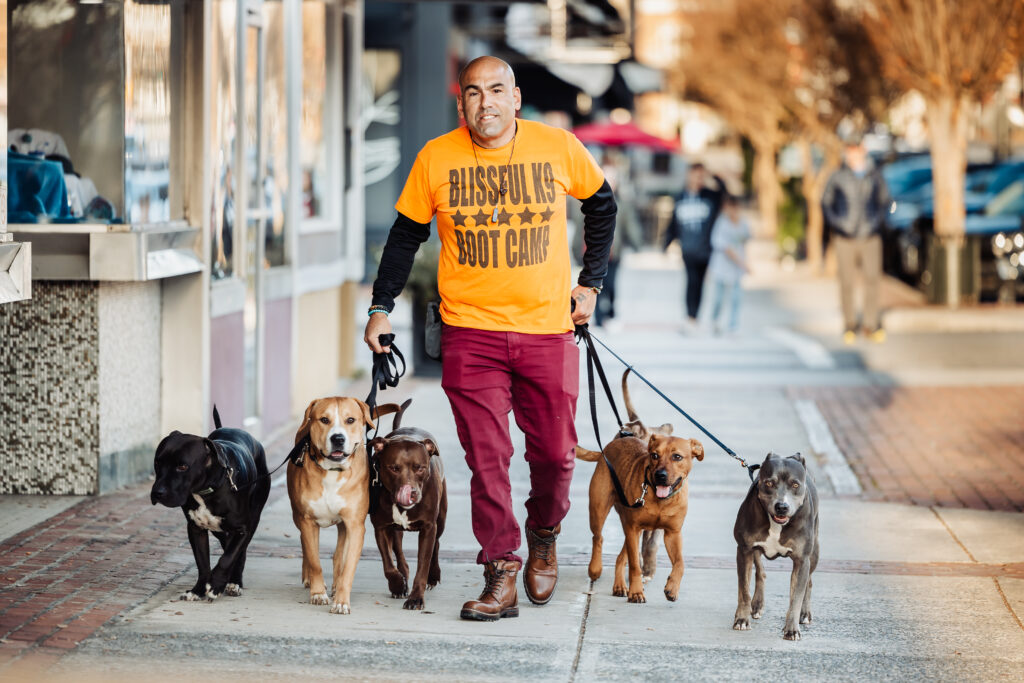
Rehabilitation, and vice versa
Atom Gullo’s career got its start in an unconventional way. “I got certified in prison,” he says. “It was a program where inmates took retired greyhound racing dogs and made them adoptable as family pets. A lot of them had zero training; they certainly were undomesticated. At the dog tracks, they were walked from their kennel to the slots to race, then back to their kennel.”
This program used a personal, hands-on model. “Each of us was assigned a dog that stayed with us for two months, all the time,” Gullo says. “They even slept in crates right beside our bunks.” Through that program, Gullo earned a state vocational certification in dog training. He worked with six different dogs for two months at a time, and he won multiple awards for Top Dog out of the whole class. “Actually,” he says, “I had one dog, Tripod—who had three legs—and she won Top Dog over lots of other greyhounds. She went on to become an ambassador for a school for handicapped kids. Another of my dogs became a service dog for a lady who had MS.”
Gullo points out that those kinds of programs don’t only help the dogs, they also help the inmates. It certainly worked for him. He explains, “I had been in trouble my whole life until I got involved in the dog training program in that Florida prison, but since then, I’ve never had any more legal issues whatsoever.” He rehabilitated those greyhounds, and apparently, they returned the favor.
Gullo is interested in starting something like that here in Floyd County, perhaps in the juvenile justice system, jails, and prisons. It would certainly be a logical next step in his work. Fortunately, a working partnership with P.A.W.S. already exists.
“I want to continue to make a difference in this community,” he says. “And I’m just one person—all across the country there are success stories of other people going through similar programs. When it comes to my passion, I love training dogs, but what really gets me fired up is working with shelter dogs—and being able to replicate a program that helps human beings as well.”
Getting started
Upon his release from prison in 2016, Gullo began working with friends’ dogs and had a few private clients before establishing his own business. “In Florida, I had worked with dogs privately and through the Humane Society,” he says. “I began by volunteering with the local shelter. In 2018, I was doing twenty to thirty hours of volunteering—in addition to my private training—and they offered me a paid job. So, I wound up as a full-time trainer there. I was there a few years, and then I went to work for another Humane Society shelter as well.”
Through those shelters, he worked with hundreds—maybe thousands—of dogs, helping them with all kinds of issues, such as aggression, fear, and abandonment. That’s what led to the creation of Blissful K9.
A nearly fatal bout with Covid, combined with a toxic mold infection—in both his apartment and his body—turned Gullo’s life upside down. Not long after being displaced from home by this fungal infestation, he relocated to Rome, where he recuperated under the watchful care of his daughter. After his recovery, he established Blissful K9 in Rome. “I started advertising it, and that’s it,” he says. Also, not surprisingly, he started volunteering with P.A.W.S., rehabilitating dogs, and helping them get adopted.
Respect and discipline
Clearly, Gullo applies a compassionate yet no-nonsense philosophy to dog training. When asked what kinds of mistakes people make with their dogs, he answers, “Too much affection, coddling them or talking to them like they’re babies. Dressing them up in clothes. Pushing them around in baby strollers. Letting the dog lead them, instead of being a proper leader for the dog. Allowing them to get away with too much. Not enough structure. Dogs have a natural desire to be led by someone; it’s a pack mentality thing. So, if we provide a clear leadership role and clear communication, they will follow, but that’s not something that just happens; you have to know how to do it.”
Because of these issues, Gullo also emphasizes training for the dog owners. He explains, “They have to learn to be the pack leader in their dog’s life. Done correctly, we provide the leadership the dog needs, giving them a clear understanding of what is expected. We build a dog’s trust by leading them in such a way that they can look to us for guidance. You can see that with a dog that is properly honed in to its owner; they’re always looking to their owner as if to ask, ‘What’s up? What do we do next?’”
According to Gullo, there is no typical timeframe for training a dog, nor is the process ever completely done. “It depends on the dog,” he says. “It doesn’t depend on the breed, either. Every dog is different. Really, it never stops; you’re always training. It’s like anything else, you have to brush up and practice—things get rusty. You don’t want things to go backward.”
So many dogs, so few volunteers
Even with compassionate shelters like the one at P.A.W.S., there is always a chronic shortage of space for housing dogs and cats. Gullo has little patience for people who reject and discard dogs because of some sort of breed stigma. “The shelters are full of pit bulls,” he says. “Any shelter you go to, they have more pit bulls than any other breed. That’s because there are so many irresponsible people out there. Yard breeders. They don’t respect the breed, and they don’t know enough about it. They make them out to be a tough dog, and then the dog winds up with behavioral problems.” Sadly, many of these dogs are never adopted. Gullo adds, “Unfortunately, shelters do euthanize dogs; they can’t live there forever.”
When people adopt dogs from a shelter, Gullo advises that they don’t take only one home. “If people have dogs,” he explains, “they should at least have two, so the dogs can have a companion. Just like humans need friendship, it’s the same for the dogs.” On this issue, Gullo practices what he preaches. He has six pit bull rescues. “Three of them I’ve gotten since I moved to Rome,” he says. “Two of them I adopted from P.A.W.S. One was found over in Garden Lakes; he was homeless, and they never found his owners, so I kept him. And my other boy, Alfalfa, was found by animal control in a treehouse. He was so shut down from fear that he couldn’t walk. They knew he couldn’t be adopted like that, so they contacted me. That day, I got him to walk out of the shelter, and he’s never stopped walking since then. Another one, Dollar, is short, stocky, and black. It’s harder to adopt black dogs because people are afraid of them. That’s called ‘Black Dog Syndrome.’ But Dollar is so well-behaved and fits well into the pack—and he’s good with cats—so I kept him.”
There are many things a volunteer can do at P.A.W.S. It’s not all about taking dogs home. Gullo says, “It would be wonderful if more people could get involved with the shelters, for advocacy for dogs in need. Volunteers can walk dogs or even just go and sit with dogs outside. Sometimes I go down to P.A.W.S, put a dog on a leash, and take it out in front of the building. We just sit there in the sunshine and watch the cars go by. Some dogs have been there their whole lives, and they’re scared of being out in public. No one’s going to adopt an animal that is completely terrified, so I get them out there in the real world. The real world is not a shelter full of barking dogs, but that’s all that some of them know.”
For more information, visit Blissful K9 on Facebook or BlissfulK9.com.
P.A.W.S. can be found at floydcountyga.gov/animal-control or on Facebook at Public Animal Welfare Services



